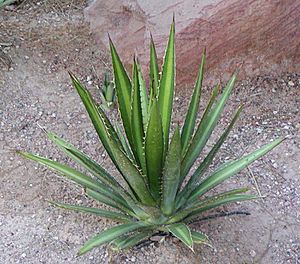Agave lechuguilla facts for kids
Quick facts for kids Agave lechuguilla |
|
|---|---|
 |
|
| Conservation status | |
| Scientific classification | |
| Synonyms | |
|
Agave lechuguilla (common name in Chihuahua: lechuguilla, meaning "small lettuce") is an Agave species found only in the Chihuahuan Desert, where it is an indicator species. It typically grows on calcareous soils. The plant flowers once in its life, then it dies. The flowers are a source of nutrients for insects, bats, and some birds.
The leaves are long, tough, and rigid, with very sharp, hard points which can easily penetrate clothing and even leather, giving the colloquial name "shin-daggers". Mexican people have used fibers from the leaves (commonly called ixtle)."
The water stored in the flowering stalks of this plant, rich in salts and minerals, is sold in Mexico as a sport drink. The plant makes up a large part of the diet of the collared peccary (SW USA: javelina) in some areas. It is toxic to cattle and sheep, however. Roots of the plants were used as soap by Native Americans.
The plant reproduces most often through underground offshoots, creating large colonies. It also can flower anytime after the plant has reached three to twenty-one years of age, producing a leafless stalk that can reach 3.7 metres (12 feet) in height. The flower clusters are located at the top and are funnel shaped in purples, reds and yellows. The plant dies after flowering.
Charles Wright first collected the plant in 1849 and it was described by John Torrey in 1859.
See also
 In Spanish: Lechuguilla para niños
In Spanish: Lechuguilla para niños


